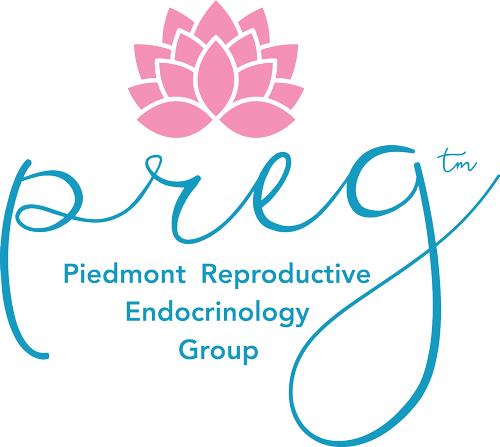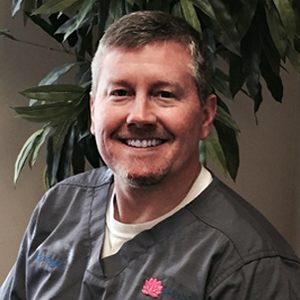 Q & A with Dr. John Frederick Payne, MD Reproductive Endocrinologist & PREG Partner Regarding Carrier Screening
Q & A with Dr. John Frederick Payne, MD Reproductive Endocrinologist & PREG Partner Regarding Carrier Screening
What is Expanded Carrier Screening (ECS)?
Carrier screening can help you prepare and plan for a pregnancy. The reason we do it is to determine if someone is at risk to pass a serious inherited health condition onto a child.
How is the testing done and why?
Typically it’s through a blood draw but it could also be a saliva test. The first reason we offer ECS testing is that inherited conditions are common. Individually an inherited condition is rare, but collectively the conditions included in a carrier screen might affect one in 300 pregnancies. The second reason for ECS is that the person’s family history doesn’t tell the whole story. While family history can tell us a lot about their health and the health of their potential baby, many carriers of inherited conditions simply don’t know they are a carrier because no one in their family history may have ever been born with that disease because they never reproduced with someone else who was also a carrier of the same disease.
The third reason for ECS is that inherited conditions don’t discriminate, meaning that anyone in any ethnic or racial group could have a baby with an inherited condition, and conditions that historically only affected a certain race are now more common in any race or ethnicity due to our reproductive patterns as a society.
Medical societies recognize the advantages of offering a screening of the same set of diseases to all patients regardless of their ancestry. Historically, diseases like Sickle Cell might only be in African Americans or Tay Sachs only in a Jewish patient. However, any ethnicity or race could potentially be at risk for any disease so it is now recommended to screen for everything in everybody, in order not to miss a carrier of disease by making assumptions about racial or ethnic history in regard to carrying a disease.
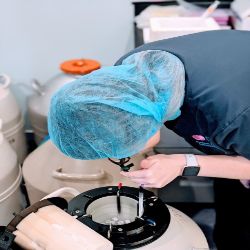 Explain the DNA footprint in terms of single or multiple carrier risk.
Explain the DNA footprint in terms of single or multiple carrier risk.
We know babies get half their genes from the mother in the egg and half from the father in the sperm. The genes pass along family characteristics that we all know such as eye/hair color, height, and things like a risk for heart disease. But genes can also pass on inherited conditions and it’s normal for people to be a carrier of an inherited condition. A person is a carrier or heterozygous when you have a normal gene from one parent and the gene from the other parent has an irregularity or mutation. Fortunately, most of the inherited diseases are autosomal recessive (like cystic fibrosis and sickle cell), which means that an affected individual received two copies of the gene that has the mutation ( irregularity), one abnormal copy of the gene from each parent. If individuals are carriers of a disease (i.e. trait) with one normal copy and one abnormal copy of the gene, they usually don’t have any symptoms.
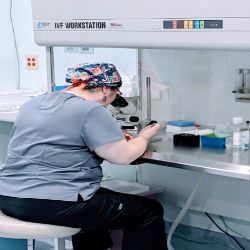 Can you expound further on this in terms of the testing and analysis?
Can you expound further on this in terms of the testing and analysis?
We are screening to see if someone is a carrier of a genetic condition and if they are what type of condition is it? There is an autosomal recessive inheritance which is where a child inherits a gene with a disease-causing variant from both parents. The other is X-linked inheritance which means that if the male inherits the X chromosome with a disease-causing variant from the mother, then the male would have the disease because a male-only has one X and one Y chromosome. Sperm can have either an X or a Y chromosome. Eggs only have an X chromosome. In the case of X-linked inheritance, the Y chromosome comes from the sperm and the X’s come from the egg. In this case, if an affected X comes from the female then the male baby would have that disease.
Expanded carrier screens (ECS) examine for an autosomal recessive inheritance/X-linked inheritance, but typically are NOT screening for dominant diseases, which fortunately are much less common, with several examples being Huntington’s Disease and Neurofibromatosis. These diseases usually have a strong family history of those diseases because if there is one copy that gets inherited that person actually is affected by the disease. Since there is a long family history, members in the family realize the need to screen for those diseases.
If you are the carrier what is the chance the child will have the disease?
If the testing results reveal an autosomal recessive disease then there is a one in four (25%) chance that the embryo or the baby would inherit both abnormal genes and would have the disease (be affected). There is also a 25% chance that the child inherits both normal genes and is neither affected nor a carrier. 50% of the time the child is a carrier (inherited one abnormal copy from one parent and one normal copy from the other parent) and would NOT be affected by the disease. If someone is an autosomal recessive carrier, they should consider having their future reproductive partner(s) screened to see if they are also a carrier for the same disease. If they both are found to be carriers, then 25% of the time that the disease would be present in their child or embryos and 75% of the child or embryos would be unaffected ( either a carrier 50% or no carrier 25%).
What are some reasons to screen for these serious conditions?
Early treatment can make a difference for some diseases like PKU (Phenylketonuria) where you can change the diet when the baby is born with the potential for less severe effects. Certain conditions can cause intellectual and cognitive disability like Fragile-X, or conditions that can shorten the life span like Bloom Syndrome. There are conditions where there are limits with no treatments like Tay-Sachs Disease but one can at least know the outcome and plan how to care for the child after birth.
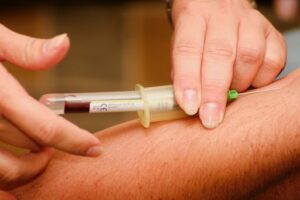 What if someone screens positive as a carrier?
What if someone screens positive as a carrier?
They have options. If they have NOT yet conceived, then IVF/ICSI with PGT-M (preimplantation genetic testing from monogenic (single-gene) disorders) is usually possible. With PGT-M, one can determine if an embryo would have the disease ( be affected) prior to performing a frozen embryo transfer and we can only transfer an unaffected embryo ( assuming one is available). If they are already pregnant they can do prenatal diagnosis testing of the pregnancy inside the mother through chorionic villus sampling (CVS) or amniocentesis to determine if the child has the inherited condition or not. Then they can plan for delivery and early treatment which can make a difference. In severe cases of severe diseases then the option for pregnancy termination might exist for some patients.
What if identified carriers don’t want to reproduce with their egg or sperm?
They can choose to use donor sperm or donor egg, or adopt to take the risk of passing the mutation along. They can use their own sperm or eggs and undergo IVF/PGT-M as well with the potential to impact the outcome before pregnancy even occurs.
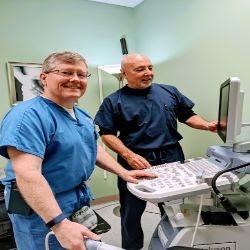 Are donor eggs and sperm screened as well?
Are donor eggs and sperm screened as well?
Yes, almost all egg and sperm donors evaluated through commercial sperm and donor egg banks are evaluated in many ways and one of those is expanded carrier screening. They are screened using ECS for approximately 200-300 diseases. Because ECS screens for that many diseases, it is not unusual for almost everyone to be positive for a carrier of at least one condition. If a donor is positive for one of these conditions then we would screen the male/female recipients or their future reproductive partners should be screened to make sure they are not carriers of the same disease. For example, if a woman is using an egg donor that tests positive for a particular disease, we would then test the male to make sure he is not a carrier of the same disease. If they both carried (matched) for the same disease, then we would recommend that one select a different egg donor to eliminate both egg and sperm being carriers of the same disease. Conversely, if the woman was using a sperm donor and the sperm donor tested positive for a mutation that she shares, we would recommend that she find another sperm donor without that disease.
Most genetic testing companies provide genetic counseling after ECS test results return. If the patient and either their partner or the egg or sperm donors do not match for the same disease, the genetic counselor who reviews the results will say there is a minimal, residual reproductive risk for that couple, meaning there is a very low chance of the child having that disease one of the partners was a carrier. Genetics counselors try to put the risk for having an affected offspring in quantifiable numbers in terms of risk such as one in 10,000, or one in 520,000 chances.
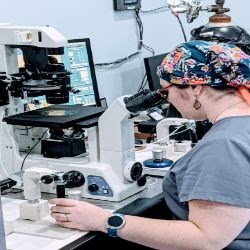 However, most people get pregnant naturally and don’t undergo ECS prior to conception or even realize that they have the opportunity to be tested for expanded carrier screening. So we all just take our chance (without realizing potential risks) if you will, we reproduce and see what happens and thank goodness the majority of people don’t carry the same gene, and even when they do 75% of the time the pregnancy is ok and doesn’t have the disease, but a 25% risk of having an affected child is very high. To put the risk in comparison, a woman age 35 has a 1/365 chance of having a child with down’s syndrome, and she is offered to have invasive testing with amniocentesis or chorionic villus sampling ( CVS) and if both reproductive partners carry the same abnormal gene they have a ¼ chance of their child having the disease.
However, most people get pregnant naturally and don’t undergo ECS prior to conception or even realize that they have the opportunity to be tested for expanded carrier screening. So we all just take our chance (without realizing potential risks) if you will, we reproduce and see what happens and thank goodness the majority of people don’t carry the same gene, and even when they do 75% of the time the pregnancy is ok and doesn’t have the disease, but a 25% risk of having an affected child is very high. To put the risk in comparison, a woman age 35 has a 1/365 chance of having a child with down’s syndrome, and she is offered to have invasive testing with amniocentesis or chorionic villus sampling ( CVS) and if both reproductive partners carry the same abnormal gene they have a ¼ chance of their child having the disease.
When we meet a couple for fertility care we let them know the option is there for carrier screening and why it’s important. Sometimes both partners will do the testing in tandem, other times typically the female will do the testing because she is having labs drawn anyway. If she is a carrier of a disease, then we then advise her to check/screen the partner to make sure he is not a carrier of the same disease. When they do match we can discuss options.
What are those options?
We can discuss the options we have as an IVF clinic with Preimplantation Genetic Testing (PGT) and we screen the embryos in two ways: PGT-A and PGT-M. First, we test the embryos for aneuploidy with PGT-A to determine if this is a normal euploid embryo with either male or female chromosome number (46 XX female or 46 XY male) or if there is an irregularity (aneuploidy) for example Down’s Syndrome or any number of other chromosomal abnormalities that could be present. Aneuploid embryos typically either will not result in a pregnancy or will lead to a miscarriage. After PGT-A then we do PGT-M testing for single-gene disorders to determine if they are present or not.
And how does this work with an IVF couple?
If we know that a couple matches for the same gene mutation through carrier screening we can do this single gene PGT-M testing with a lab and determine if the embryo that is tested would or would not have the mutation and be affected. We now have the ability prior to an embryo transfer to know if the embryo is normal and is not going to be affected by the disease. We can stop a disease from happening before pregnancy occurs by not transferring an affected embryo if we know to look for that one condition found through ECS.
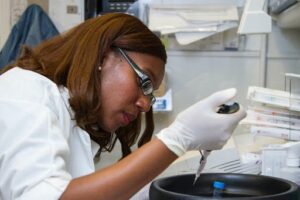 How long has carrier screening been available?
How long has carrier screening been available?
ECS has been available for 20-25 years or more. However, the ability to test for more diseases has increased each year and the way that it’s done has become more efficient and less costly. For example, it used to cost $350 for a single Cystic Fibrosis screening alone and now we screen almost 300 diseases in some panels for $250. In many cases, insurance covers the genetic testing of ECS and many covers with no cost to the patient. The patients can also be self-pay with costs around $250 or less if the insurance happens to not cover or the cost is more through insurance. The ability to screen with ECS has improved as well as the number of diseases we can identify. The technology required and used to find the disease mutations in an embryo before the transfer has really improved over time. This is why we encourage everyone attempting to reproduce to screen with ECS. So that if they did match as carriers for the same disease, they have the opportunity to screen their embryos with the PGT-M testing for the single gene disorder and to know prior to transfer they have both a euploid embryo and an embryo that will NOT be affected with the disease.
So a prior natural, healthy pregnancy doesn’t necessarily mean the next baby will be healthy?
That is exactly right if reproductive partners happened to both be carriers of the same disease, they can have four healthy children and never have a child with disease and the fifth child has the disease because each time there is only a 25% chance if they are carrying the same gene that they will have a problem. For X-linked diseases, 50% of the time the boy could get the disease if the mom carries it because if she’s a carrier for an X-Linked disease, she is either passing the good gene or the bad one. When the affected gene is passed in the egg on the X chromosome and the sperm passes the Y-chromosome, the male offspring would be affected by the disease ( for example Duchenne Muscular Dystrophy is an X-linked disease). If the female is a carrier of an X-linked disease, half of her girls would be carriers, but half of her boys would have the disease (received the bad X chromosome) and the other half would pass the good chromosome that doesn’t have the mutation so the boy would not have the disease and not be a carrier either.
The ECS testing lets people know if they are at risk to have a child with a certain disease coming either from the mother’s side or the father’s. It allows them the opportunity to do PGT testing through IVF and test and determine if they have any unaffected embryos to transfer to conceive. Or they can decline IVF and attempt natural conception or even fertility treatments without IVF and take their chances, with the opportunity to test the pregnancy once it is established with amniocentesis or CVS which can allow them to plan ahead if an affected pregnancy with the disease is found or can be reassuring if the fetus is not affected.
How has the testing expanded and grown over the years?
The panels have expanded from one test to 23 to 100 and now we are screening over 280 conditions or diseases in some panels. It takes just a couple of tubes of blood or saliva to perform these tests. The tests generally result within two to three weeks. Then an appointment is made with a genetic counselor that is skilled in explaining the results of the tests and how it affects you and your offspring. IF you test and your partner’s test shows no match, then you should have minimal residual reproductive risk, but if you do match there are options. I’m sure that genetic testing in the next 25 years will be far more advanced than it is today based on the amazing progress that has been achieved over the last 20-30 years.
What about insurance coverage for this screening?
90% of patients with insurance coverage don’t pay anything, and for the rest that is self pay the ECS typically costs $300 or less. At PREG we use SEMA4 and Myriad for screening. They both accept insurance and let patients know ahead of time what their insurance will cover. If they don’t have insurance or have a high deductible, both allow rates for self/cash pay for the testing which is going to be around $250 for testing one partner and an additional $100 for testing the second partner. In general, for less than $350, sometimes even lower, both partners can be tested. This seems very reasonable to have the peace of mind that your child will have minimal risk of being affected by some terrible diseases that can be prevented.
Since most couples do not match for the same diseases, there is nothing further we need to do after the ECS is completed. The method of conception shouldn’t affect the chance to have a child with the diseases screened and your chances should be basically zero. That’s reassuring for the diseases we can currently screen and the number of diseases screened is expanding over time.
 PREG has 3 IVF Centers (Greenville, Columbia & Lowcountry) with satellite offices in Asheville & Spartanburg.
PREG has 3 IVF Centers (Greenville, Columbia & Lowcountry) with satellite offices in Asheville & Spartanburg.
866.725.7734
(Images: Unsplash.com)
